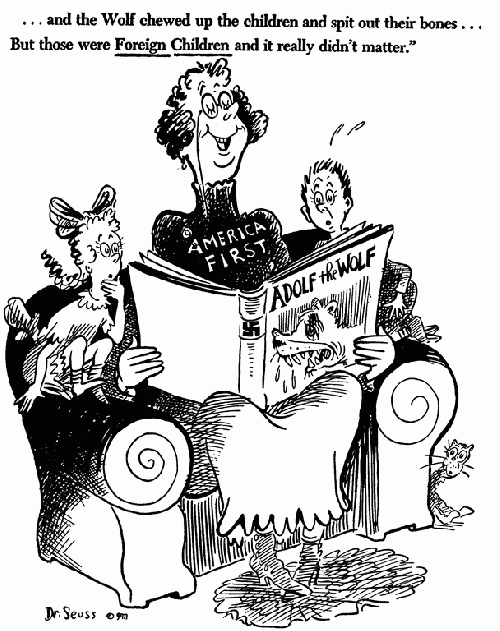
... and the wolf chewed up the children and spit out their bones... but those were foreign children and it really didn't matter.
(Image by (From Wikimedia) Dr. Seuss, Author: Dr. Seuss) Details Source DMCA
Dr. Seuss (Theodor Seuss Geisel, Mar. 2, 1904 -- Sept. 24, 1991) was the Baby Boomers' most beloved artist-author and his timeless popularity has never subsided. Horton Hears a Who! was published in 1955 and The Cat in the Hat in 1957. Seuss was not a Ph.D; he adopted the "Dr." moniker because his father wanted him to become a medical doctor rather than an artist. His family was German and he was raised Lutheran.
Childless, his 60+ children's books sold over 600 million copies by the time of his death. Dr. Seuss was also a poet, animator, book publisher, and political cartoonist who devoted a significant amount of his creativity toward artistic support of the US involvement in WW2.
Seuss was also a liberal Democrat and was a staunch supporter of FDR and the New Deal. "His early political cartoons show a passionate opposition to fascism, and he urged action against it both before and after the United States entered World War II."
His views on immigrant children are expressed in the accompanying political cartoon, another example of his timeless art and perspective. It appeared in PM Magazine on October 1, 1941, with the caption, "... and the wolf chewed up the children and spit out their bones... but those were foreign children and it really didn't matter."
Most of Seuss' children's books have a progressive theme. For instance, the topic of Yertle the Turtle (1958), was Adolf Hitler and anti-authoritarianism. The Lorax (1971), addresses environmentalism and anti-consumerism; and The Sneetches (1961) focused on racial equality.
... and the wolf chewed up the children and spit out their bones... but those were foreign children and it really didn't matter.
(Image by (From Wikimedia) Dr. Seuss, Author: Dr. Seuss) Details Source DMCA
[Wiki's note: this cartoon as a digital object was made available by Special Collections & Archives, UC San Diego Library, La Jolla, 92093-0175]





